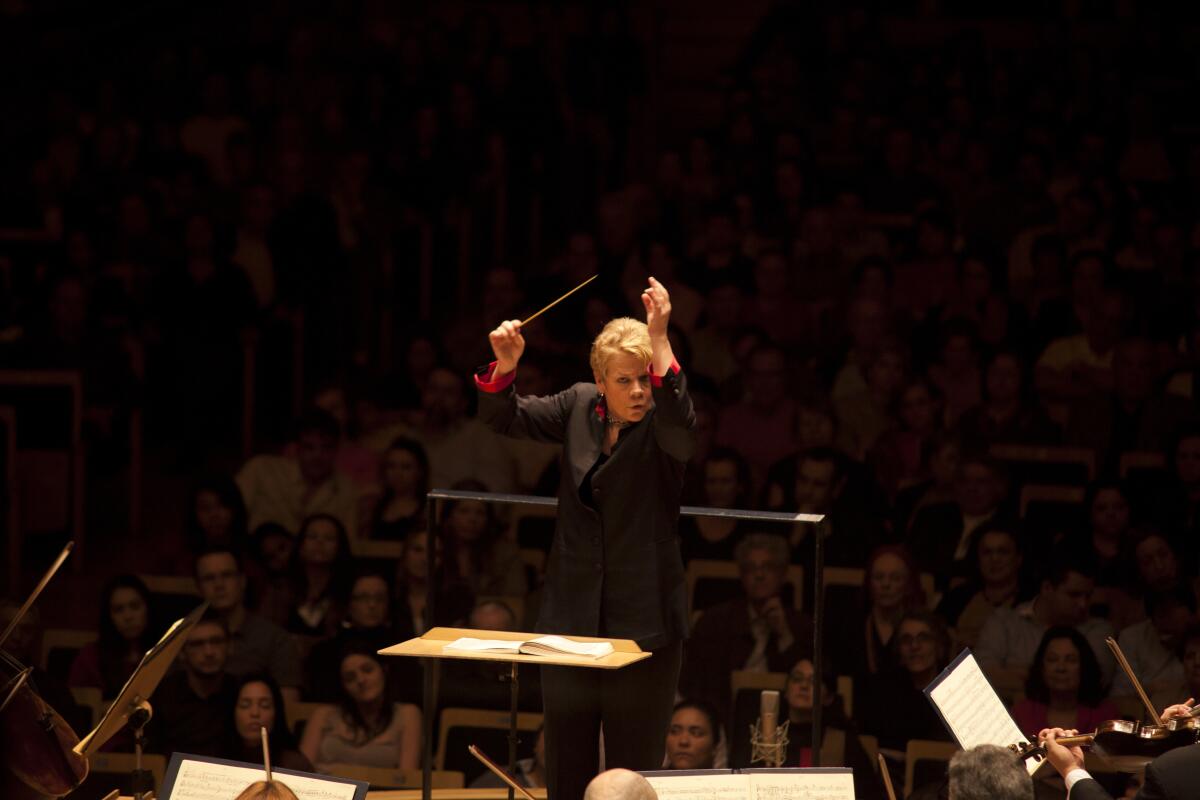Review: Marin Alsop is an admirable agent for change in the documentary ‘The Conductor’

- Share via
The Times is committed to reviewing theatrical film releases during the COVID-19 pandemic. Because moviegoing carries risks during this time, we remind readers to follow health and safety guidelines as outlined by the Centers for Disease Control and Prevention and local health officials.
Science has shown that lightning rods are conductors. In the world of music, when Marin Alsop became the Baltimore Symphony Orchestra’s music director in 2007 — the first woman to head a major American symphony — a conductor became a lightning rod.
But when classical music’s elitist, patriarchal old guard quieted, as Bernadette Wegenstein’s new biographical documentary “The Conductor” shows, Alsop’s vision and abilities got to be the story. In her years of cultural leadership, she’s been more than just an internationally renowned conduit for the intentions of history’s great composers and the sounds filling a concert hall. She’s also absorbed the hopes of young baton-holding aspirants and underserved musicians everywhere, nurturing their dreams and spreading them far and wide.
The long-accepted irony of the bio-doc genre (which makes it no longer an irony, really) is that the type of trailblazing figure who earns feature treatment doesn’t usually get a similarly trailblazing, or even just gloriously offbeat, movie about them in return. Yet while “The Conductor” isn’t redrawing the documentary form, it’s nevertheless pleasurably illuminating as admiration cinema about a feminist hero who bucked tradition and broke rules to make herself — and the significant music she’s curated — heard on her terms.
Its straightforwardness aside, “The Conductor” approaches Alsop’s life not unlike a symphony, its parts gradually unifying as a narrative of singular ambition, achievement and fortitude. Alsop does the telling too, in interviews and voice-over and in scenes where Wegenstein follows her around the world (São Paulo, Lucerne, Vienna) as she readies a Mahler symphony.
There’s the childhood sonata in which a violin-playing daughter of New York-based string players attends one of Leonard Bernstein’s Young People’s Concerts in the ‘60s and decides she wants to do what he’s doing, only to be told throughout her growing years that girls can’t become conductors. (“Can’t” is Alsop’s four-letter word, she tells us.)
There’s the scherzo where rejection to study conducting at her violin alma mater Juilliard spurs creativity in her 20s, and she starts an all-female swing ensemble with string instruments and later her own classical orchestra. There’s the reintroduced melody of Bernstein, who became a beloved mentor/friend when she finally got the opportunity to study her calling under him in his final years. And then the realization of Alsop’s dream, as prestigious appointments led to her groundbreaking tenure in Baltimore, which she turned into a soaring movement of performance and outreach that included the founding of a beloved music-making afterschool program called OrchKids.
We also get a glimpse of Alsop’s home life with longtime partner Kristin Jurkscheit and their son Auden. But the film’s attempt to frame their understandable domestic unevenness (Marin’s never home!) as cutely relatable feels strained and hardly comparable to most households when Alsop speaks to the reality for women conductors, and why, on top of her many responsibilities, she started a fellowship for them: “You need room to fail,” she says, “but you can’t fail.”
This is why the movie’s surest asset as a feminist narrative is how Alsop’s example demystifies conducting while still retaining its power to enchant us, and yet look like the hard work that it is. It’s in how she talks about it as “a way to feel human.” It’s in the moments we see her at the stand in rehearsal or performance, like a dynamic beacon for harmony instead of the historically accepted image of the imperious, stodgy (and male) taskmaster.
And it’s there in the lovely verité scenes with nervous but excited mentees, both women and men — Alsop’s way with them is assured and reassuring, critiquing but not critical. It’s as if she’s conducting futures, not just players of instruments. “The Conductor” will leave you hopeful for what the next generation brings, even if the fight for equality since Alsop stepped down from leading BSO last year indicates how much still needs to be done as batons get passed. There is still only one woman — Nathalie Stutzmann in Atlanta — who is music director at a major American orchestra.
'The Conductor'
Not rated
Running time: 1 hour, 30 minutes
Playing: Starts Feb. 4 at Laemmle Royal
More to Read
Only good movies
Get the Indie Focus newsletter, Mark Olsen's weekly guide to the world of cinema.
You may occasionally receive promotional content from the Los Angeles Times.










